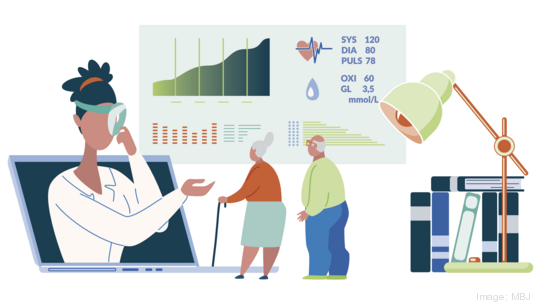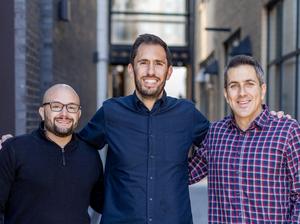
Dietitians on Demand started as a way for co-founder Alicia Davis to earn some extra money and gain flexibility. The Richmond company has turned into a thriving business with more than 200 employees and it recently launched a telehealth service.
Alicia and her husband, Ryan Davis, started Dietitians on Demand in 2005. Alicia is a registered dietician and saw a need for contract dietitians. Nursing homes and hospitals often only have a couple of dietitians on staff and had a difficult time when Alicia took time off. Alicia and Ryan were planning to start a family, so Alicia reached out to several organizations about filling in for people, much like how a staffing service operates. They would call her up when they had a position to fill temporarily.
Soon, Alicia “had more work than she could handle,” according to Ryan.
For two years, Alicia worked with several medical organizations within Richmond, and then Ryan and Alicia saw an opportunity to grow Dietitians on Demand. Ryan quit his job and joined the organization in 2007 as CEO. The service was launched in Northern Virginia, Maryland and D.C. Over the next few years, Dietitians on Demand was rolled out nationally and now works with registered dietitians across the country. The company temporarily staffs dietitians at hospital, nursing homes and other health care facilities.
“Over the time we have been doing this, we built up a huge network of dietitians all across the country for the purpose of being able to offer them jobs at clinical facilities,” Ryan said. “We had access to hundreds if not thousands of registered dietitians and the ability to specialize in a lot of areas. We got to thinking — what can we do with this as a resource?”
That led to the launch of a telehealth service. Inside a facility, dietitians are often doing very technical work that requires in-person evaluations. For example, an elderly person who had lost a significant amount of weight or a patient who was placed on a ventilator. These treatments require nutritional calculations and demand that dietitians be inside the facility.
But nutrition and diet services are easier to perform through telehealth. Ryan used the example of someone who had blood work done and was diagnosed as being pre-diabetic. A dietician could examine the bloodwork and develop a meal plan for the patient through a telemedicine appointment.
“You can get personalized nutrition coaching that is tailor-made for you,” Ryan said.
To provide the telehealth services, Dietitians on Demand has licensed Healthie, a HIPPA-complaint platform. The dietician and the patient log into the platform and discuss the patient’s needs and treatment. The service often begins with a free 15-minute discovery call.
Ryan said the interest from the dietitians has been overwhelming. When the company sent out an email about the new service, more than 400 registered dietitians responded. Dietitians on Demand selected 15.
Currently the telehealth service is cash only, but Ryan expects the company to finalize an agreement with insurance company UnitedHealthcare. Once that happens, Ryan said he wants to approach doctor’s offices and other medical organizations. Many of these places need the services of a dietician but do not have enough work for a full-time person. They will be able to refer patients once Dietitians on Demand can accept insurance.
The company is working to streamline and standardize the process. The lead dietitians at Dietitians on Demand are developing protocols for the telehealth appointment so patients always receive a standard level of care.
Dietitians on Demand is self-funded and 100% owned by Alicia and Ryan. The company has 22 employees in the corporate office and placed over 200 dietitians at facilities in August. The dietitians who provide the telehealth services operate as independent contractors, but the dietitians who are placed inside a facility work as W-2 employees.
Ryan said the company is low-profile but provides a valuable service within the medical community.
“I tend to think we fly under the radar,” Ryan said. “We are just kind of here in Richmond doing our thing.”
Ryan is confident that demand exists for the telehealth service because people want access to scientifically based nutrition. People often try to get nutritional information off the internet, but that is not always reliable, he said.
“You will be working with someone who knows the science behind nutrition, not just trends in nutrition,” Ryan said.


